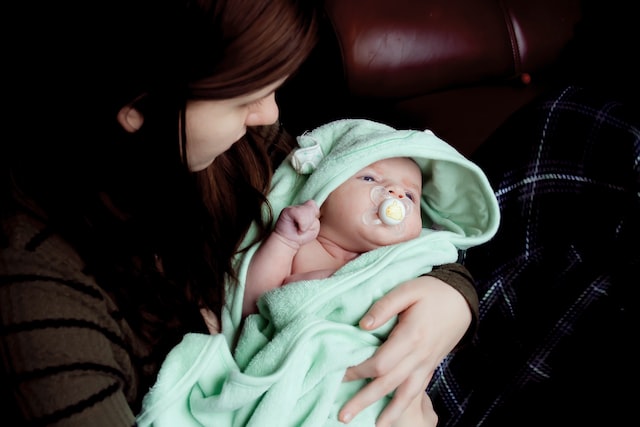A Doula's Work
Being pregnant can be an incredibly joyous journey. Most moms, however, experience a wide range of emotions and situations during this time. Some days, you might feel anxious or uncertain about how you will figure it all out. Other days you might feel balanced and strong. And once your baby is born, you may feel overwhelmed and exhausted by the thought of managing it all. How you experience pregnancy and birth is individual and unique and there is no right or wrong way.
For the last day of International Stress Awareness Week, I interviewed Birth Doula and Massage Specialist, Ana Munoz. She considered becoming a midwife while attending nursing school, but was later drawn to becoming a Doula instead.
Ana loved the idea that someone would be available to support a laboring mother in terms of education, emotional support, and physical care.
Ana also shared how mental wellbeing and childbirth are closely related and spoke about her role in supporting moms throughout this journey. Providing doula services is no easy feat because Ana has to be available 24/7 for any eventualities. This has had an impact on her own family life, but she passionately loves what she does and her family supports her wholeheartedly.
“There is such a special sweetness in being able to participate in creation.”
- Pamela S. Nadav
Although I can’t personally speak to pregnancy and birth, I have been part of many birth journeys. I am in complete awe of moms and what they experience during this time. But I have also seen how the system has failed new moms and the resulting devastation that changes lives. I am a huge supporter of midwives and doulas because they ensure moms receive access to the care they need.
Pregnancy and Mental Wellbeing
Pregnancy can be a very vulnerable time for moms with so many changes going on, both mentally and physically. The hormonal changes make it more challenging to maintain balance and a sense of wellbeing. And if mental distress was already a problem before, pregnancy may exacerbate what you were experiencing. Your body undergoes a variety of changes throughout pregnancy. Morning sickness, tiredness, headaches, and backaches are all common experiences. They can, of course, affect your overall well-being while you are pregnant. Depending on how you experience your pregnancy physically, it can positively or negatively impact your mental well-being as well.
Some moms worry about what lies ahead for them. Perhaps you didn't plan to become pregnant. Maybe you are concerned about how a new child will impact your relationship or marriage. You may experience financial anxiety about another addition to your family. Or perhaps you are worried about the actual experience of giving birth. Many women experience some or all of these fears during pregnancy.

For some women, worries and anxiety could progress into more serious distress. It is estimated that about 10% to 20% of women experience perinatal depression, either during pregnancy or after birth. Some risk factors include previous mental distress, an unwanted pregnancy, a traumatic pregnancy or birth, a lack of social support, a history of abuse, and American Indian/Alaska and Hawaii Native heritage.
The most crucial step is to talk about what you are experiencing. Perinatal depression screening is a covered medical expense and leaving it untreated can have serious consequences for mom and baby. If you are not comfortable speaking to your doctor, you can connect with your midwife or doula, to discuss what steps can be taken to get you the support you need.
Birth and Mental Wellbeing
While pregnancy can be a stressful time, moms also need to prepare for birth. The time just before and after birth can be physically and mentally challenging. First-time mothers often lack the knowledge and support to prepare for birth. Feeling alone or isolated can affect your mental well-being and add even more stress and tension.
If you have to care for multiple young children at once, you may find yourself overwhelmed by the thought of birth preparations. Especially if you have no family support and no social network to rely on, giving birth and caring for your family after can be a difficult experience. This time between giving birth and adjusting to your new baby is when many women find they need the most support.

We already touched on perinatal mental distress and after giving birth, some women may develop postpartum depression. About 1 in 5 women will experience mental distress in the first year after giving birth. At first, you may just think that the roller coaster emotions and constant exhaustion are a normal part of adjusting to motherhood. But when these emotions don’t level out or worsen, it is crucial that you speak to your healthcare provider.
As with perinatal depression, recognizing postpartum depression is an important part of being able to treat it. Unfortunately, many women at risk of or diagnosed with postpartum depression do not end up getting the help they need. That’s why it is so important that you advocate for yourself, or have a loved one, your midwife, or doula advocate for you. The people around you may notice right away that something is off and can help you find and organize the support you need.
Working with a Doula
A doula is somebody who supports you emotionally and physically throughout your pregnancy and delivery. Doulas are not licensed doctors or nurses. They do not perform any medical childbirth interventions and they do not prescribe medication. A doula who has earned a certification has completed a training course and gained experience with supporting expectant mothers and their families during pregnancy and birth.
Depending on what you feel comfortable with, doulas can play a variety of roles. Doulas for labor and delivery will prepare a birth plan with you before the delivery date and be present during labor and birth, providing support like breathing and massage techniques. Antepartum doulas can assist mothers on bedrest and their services can include some help with childcare and household tasks. Postpartum doulas support the new mother in the initial weeks following delivery. They can help with domestic tasks, baby care, and feeding.

Many doulas work with an expectant mom from the beginning. They accompany you during your pregnancy, create a birth plan with you, are present for the labor and delivery, and help you settle in with your new baby after the birth. Doulas generally commute from their homes to the chosen hospital or birthing center, but they can also assist in home births, depending on your medical situation. Often, doulas work with midwives and doctors, as part of your support team.
Working with a doula during your pregnancy and birth can have many benefits. Some studies have shown that support from a doula can decrease the use of pain medication during labor, decrease C-sections, decrease time in labor, and decrease difficult or traumatic birth experiences. Before deciding on a doula, you can meet with her in advance and see if you feel comfortable.
The Takeaway
Birthing a new life is a life-changing experience, and adjusting to the physical and emotional changes can take some time. A variety of things can affect your physical and mental well-being during and after pregnancy and a strong support network is essential. Even though one in five women will need support, only about 50% of first-time parents ask for support.
New parents may not know that mom is experiencing mental distress. Even though most partners can tell that something is off, they often don’t know if it warrants speaking to a doctor or midwife about it. Many moms also don’t know where to ask for help. They may have been handed a brochure at their doctor’s office with no further explanation. And many moms feel afraid or ashamed to ask for help. They may feel it makes them a bad mom or their baby may be taken away.

It is important to understand that help and support during and after pregnancy is an essential part of mental and physical well-being. Having family members help with your baby, so you can get some much-needed rest can help support your well-being. Receiving support from friends and family around the house with cooking, cleaning, and laundry can also go a long way to support well-being.
Many moms don’t have those options, which is why it is so important to ask your healthcare professional or your care team for help and support when you need it.
Depending on where you live, professional support is a covered medical expense, and some home support and care services may also be paid for by the state or your healthcare coverage.
Growing, birthing, and raising a child is a monumental task and you deserve help and support so you can thrive while caring for yourself and your baby!
Branjerdporn, G., Hussain, B., Roberts, S., & Creedy, D. (n.d.). From Pregnancy to Postpartum: When Mental Health and Wellbeing Are Threatened. MDPI. Retrieved September 23, 2022, from https://www.mdpi.com/journal/ijerph/special_issues/Pregnancy_Postpartum_Mental
Butler Tobah, Y. (2021, February 3). What are the benefits of having a doula? Mayo Clinic. https://www.mayoclinic.org/healthy-lifestyle/labor-and-delivery/expert-answers/doula/faq-20057910?reDate=01112022
Childbirth and mental disorders - PMC. (n.d.). NCBI. Retrieved September 23, 2022, from https://www.ncbi.nlm.nih.gov/pmc/articles/PMC7061336/
Pregnancy and your mental health. (n.d.). Better Health Channel. Retrieved September 23, 2022, from https://www.betterhealth.vic.gov.au/health/healthyliving/Pregnancy-and-your-mental-health
The role of pregnancy acceptability in maternal mental health and bonding during pregnancy - BMC Pregnancy and Childbirth. (2022, March 29). BMC Pregnancy and Childbirth. Retrieved September 23, 2022, from https://bmcpregnancychildbirth.biomedcentral.com/articles/10.1186/s12884-022-04558-6
Van Niel, M. S., & Payne, J. L. (2020). Perinatal depression: A review. Cleveland Clinic Journal of Medicine, 87(5), 273–277. https://doi.org/10.3949/ccjm.87a.19054
https://thejornipodcast.com/episode-30-beautiful-birth-journey-with-ana-munoz
